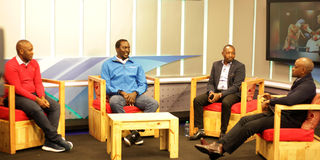NOC-K backs World Athletics' ban on transgender athletes

National Olympic Committee of Kenya (NOC-K) Secretary-General Francis Mutuku (second right) and Athletes Representative Humphrey Kayange (centre) during NTV Live sports show, SportOn! hosted by Bernard Ndong (right) and James Wokabi (left) at Nation Centre on March 27, 2023.
What you need to know:
- It required transgender athletes to maintain their testosterone levels below 2.5 Nanomoles per litre (nmol/L) for 24 months to be eligible to compete internationally in the female category.
- For DSD athletes, the new regulations will require affected athletes to reduce their testosterone levels below a limit of 2.5 nmol/L for a minimum of 24 months to compete internationally in the female category in any event.
The National Olympic Committee of Kenya (NOC-K) has supported the move by the World Athletics to ban transgender athletes from competing in women's races.
NOC-K noted that while the move by World Athletics to tighten eligibility regulations for athletes with Differences in Sexual Development (DSD) is to create level playing field in women's competitions, a candid conversation is needed.
“Sports is all about fairness and equality hence the regulations therefore does, to a certain level, bring some equality,” said NOCK secretary general Francis Mutuku.
“We try to make sports as level as possible, hence it’s unfair if one has an advantage over the rest at the starting line,” explained Mutuku.
NOCK Athletes Representative Humphrey Kayange said fairness is paramount in sports even though he empathised especially with the DSD athletes since it’s not their will to be born with an abnormality.
Mutuku and Kayange were speaking during the NTV’s Monday night live sports show SportOn! hosted by Bernard Ndong and James Wokabi.
“Empathy is the key word since we want everyone to play and enjoy sports. We need to have a huge discussion since it’s not only in sports, DSD people are in our community,” said Kayange, who called for the creation of DSD categories in athletics.
“Maybe, they should in future have categories like those in Paralympics, serving every athlete with a disability, ” said Kayange as Mutuku emphasised that they will be guided by the regulations from the respective global sports bodies.
“We don’t want to select an athlete who will later be disqualified over some regulations,” said Mutuku.
Some of Kenya’s athletes who will be affected by the new DSD regulations are 2016 Rio Olympic Games 800m bronze medallist Margaret Nyairera and the national 100m and 200m record holder Maximilla Imali, who is also the Africa 200m silver medallist.
Nyairera had scaled to 200m and 100m, while Imali had dropped to 200m and 100m following the introduction of the regulations in 2019.
Also hit hard by the move are South Africa’s Caster Semenya, Burundian Francis Niyonsaba and Namibian pair of Christine Mboma and Beatrice Masilingi.
The World Athletics President Sebastian Coe disclosed that the Council on Thursday resolved to exclude male-to-female transgender athletes, who have been through male puberty from female World Rankings competition from March 31, 2023.
A statement from World Athletics indicated that the global athletics governing body conducted a consultation period with various stakeholders in the first two months of this year, including Member Federations.
The consultations also involved the Global Athletics Coaches Academy and Athletes’ Commission, the International Olympic Committee (IOC) as well as representative transgender and human rights groups.
World Athletics noted that it became apparent that there was little support within the sport for the option that was first presented to stakeholders.
It required transgender athletes to maintain their testosterone levels below 2.5 Nanomoles per litre (nmol/L) for 24 months to be eligible to compete internationally in the female category.
For DSD athletes, the new regulations will require affected athletes to reduce their testosterone levels below a limit of 2.5 nmol/L for a minimum of 24 months to compete internationally in the female category in any event.
Previously, athletes with high testosterone were required to compete in 100m and 200 or long distance races from 3,000m.
Alternatively, they were required to lower their testosterone level to 5 nmol/L and under to compete across the distances.




